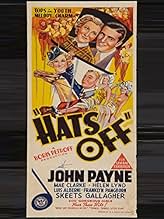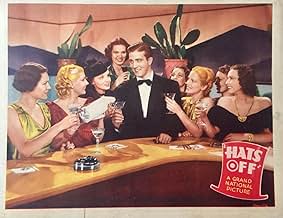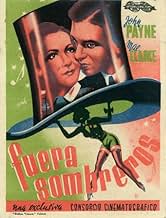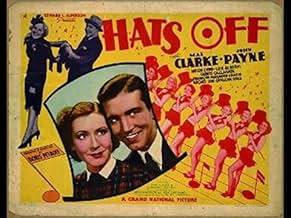AVALIAÇÃO DA IMDb
5,3/10
201
SUA AVALIAÇÃO
Adicionar um enredo no seu idiomaRival press agents Jimmy Maxwell and Jo Allen have both been assigned to stir up publicity for separate exhibitions at the 1936 Texas Centennial.Rival press agents Jimmy Maxwell and Jo Allen have both been assigned to stir up publicity for separate exhibitions at the 1936 Texas Centennial.Rival press agents Jimmy Maxwell and Jo Allen have both been assigned to stir up publicity for separate exhibitions at the 1936 Texas Centennial.
- Direção
- Roteiristas
- Artistas
Richard 'Skeets' Gallagher
- Buzz Morton
- (as Skeets Gallagher)
Franklin Pangborn
- Mr. Churchill
- (as Franklyn Pangborn)
The Radio Rogues
- Comic Trio
- (as The Three Radio Rogues)
Phil Bloom
- Cornerman
- (não creditado)
Ralph Brooks
- Nightclub Patron
- (não creditado)
Wheaton Chambers
- Board Member
- (não creditado)
Avaliações em destaque
This is a bit of an odd curio, in the fact that this is looks to be an attempted at a high-polished musical by a low rent studio. The Results are mixed here. Some of the songs are rather low rent.. I mean, the Twinkle Twinkle bit is nothing short of stupid, and the final number is just plain boring, but the boxing number and the bar sequence are fun, though implausible (How can a boxing match be commentated by a sextet?) The story is screams 1930s, about dueling fairs in nearby cities, and their attempts to outdo each other. John Payne and Mae Clarke play the publicists of the two fairs, and they try to outdo each other, and try to hire the famous show creator Bosero. Naturally, skulduggery follows. Mae Clarke is okay I suppose, and John Payne plays his Jimmy Stewart imitation quite well, What somewhat fails them is the potholes in the script, like there are incredible leaps in comprehension, how exactly was the Texas tycoon convinced to go to the bar in the first place? Who exactly was Bosero putting the show on for? And since the lead singer / dancer quit, well, what happened then? This is a movie that you really, REALLY have to squint in order to enjoy, and just keep a loose head as possible, because if you think to much about the comprehensiveness of this, your head will explode.
A couple of cities which sound an awful lot like Dallas and Fort Worth in real life take their rivalry quite seriously. Both are planning big expositions wanting to be chosen as the site of a planned World's Fair.
John Payne plays the organizer for the show of one of the cities and Mae Clarke is sent in to spy on him for the other. Of course the inevitable happens, need I go any farther.
The songs are provided by the team of Ben Oakland and Herbert Magdison and one of them, Twinkle Twinkle Little Star did enjoy some minor success during the time.
This was Payne's second feature film and first lead after being spotted in a minor role in Dodsworth. He'd have to wait for a few years before hitting the big time with 20th Century Fox.
Maybe this might have faired better at a major studio, but this was Grand National Pictures. As it is it's pleasant enough entertainment but nothing spectacular.
John Payne plays the organizer for the show of one of the cities and Mae Clarke is sent in to spy on him for the other. Of course the inevitable happens, need I go any farther.
The songs are provided by the team of Ben Oakland and Herbert Magdison and one of them, Twinkle Twinkle Little Star did enjoy some minor success during the time.
This was Payne's second feature film and first lead after being spotted in a minor role in Dodsworth. He'd have to wait for a few years before hitting the big time with 20th Century Fox.
Maybe this might have faired better at a major studio, but this was Grand National Pictures. As it is it's pleasant enough entertainment but nothing spectacular.
Minor attempt to duplicate the worldwide sensations of the Rogers-Astaire musicals at RKO, "Hats Off" was made by a Poverty Row studio that lasted only three or four years, Grand National. They even managed to bring in a couple of the second bananas from Ginger's movies, Luis Alberni (Roberta) and Franklin Pangborn (Professional Sweetheart, Flying Down to Rio); this pair of actors was to reappear the following year in the excellent "Easy Living."
"Hats Off" suffers greatly from a simple lack of money; the props are no match for the legendary Great White Sets that RKO was producing for their musicals; the lighting and camera work are not up to any major studio's standards; the editing is... well, poverty level; they clearly didn't pay a lot for the script; and the music is less than stellar. Is it a great movie no but it's a lot of fun and a good example of 1930s filmmaking by a minor studio.
According to a much later interview with her early roommate Barbara Stanwyck, Mae Clarke was actually a fine dancer, but there's no attempt to bring her talent to the screen here. John Payne is great in a very early role - his hair cream splendor reminds one sharply of the style that was still popular when Elvis Presley was using it 20 years later.
"Hats Off" suffers greatly from a simple lack of money; the props are no match for the legendary Great White Sets that RKO was producing for their musicals; the lighting and camera work are not up to any major studio's standards; the editing is... well, poverty level; they clearly didn't pay a lot for the script; and the music is less than stellar. Is it a great movie no but it's a lot of fun and a good example of 1930s filmmaking by a minor studio.
According to a much later interview with her early roommate Barbara Stanwyck, Mae Clarke was actually a fine dancer, but there's no attempt to bring her talent to the screen here. John Payne is great in a very early role - his hair cream splendor reminds one sharply of the style that was still popular when Elvis Presley was using it 20 years later.
I can only hope that there are still Americans like those in this film in today,s USA. The movie gives us one hour of light popular musical enjoyment. John Payne as usual presents a very likable and professional acting performance. Mae Clarke is pretty and charming and I have fond memories of her in other films. Franklin Pangborne contributes his unique comedy talents. It is good to visit a past era when fine human qualities of USA life were presented to the world via the Movies and universally admired.. Of course, much that was unpleasant was rarely shown but at least we can take a break from the worries of modern life and just relax and enjoy one hour of escape.
Grand National, that very modern but mismanaged Hollywood mini major from just 1935-38, looked like they just might give Republic and Universal and Columbia a serious run for their place in the mid thirties. Lucky enough to score James Cagey for a few films: GREAT GUY and SOMETHING TO SING ABOUT, this funny lively well made musical ....a bit like WHOOPEE and pre-empting GIRL CRAZY showed they meant box office business in all forms of films..from tough guy pix to westerns and musical combos of both. HATS OFF is a modern day musical about publicity, a female reporter spying on a rival town's major business and manufacturing show... and falling for the architect played by a very young and handsome John Payne. It sort of loses the thread of the story about 2/3 of the way through but it is a very likable film with terrific sets and costumes especially in the nightclub musical scenes.
Sadly they went broke by overspending on their Cagney musical SOMETHING (above) and lost $800k. they never recovered and went out of the biz in 1939. Their studio became PRC. Had Grand National survived, they would have lasted well into the TV era and produced a lot of solidly made films. Check that logo! one of the best and most exciting ever on the front of any film!
Sadly they went broke by overspending on their Cagney musical SOMETHING (above) and lost $800k. they never recovered and went out of the biz in 1939. Their studio became PRC. Had Grand National survived, they would have lasted well into the TV era and produced a lot of solidly made films. Check that logo! one of the best and most exciting ever on the front of any film!
Você sabia?
- CuriosidadesThis film received its initial USA telecast Sunday 22 February 1942 on New York City's pioneer television station WNBT (Channel 1). On the West Coast its earliest documented telecast took place in Los Angeles Monday 10 March 1947 on Don Lee's still experimental W6XAO (Channel 2); its next airings were in New York City Sunday 18 September 1949 on WPIX (Channel 11), in Cincinnati Thursday 8 December 1949 on WKRC (Channel 11), and in Chicago Saturday 8 April 1950 on WBKB (Channel 4).
Principais escolhas
Faça login para avaliar e ver a lista de recomendações personalizadas
Detalhes
- Tempo de duração
- 1 h 6 min(66 min)
- Cor
- Proporção
- 1.37 : 1
Contribua para esta página
Sugerir uma alteração ou adicionar conteúdo ausente





















